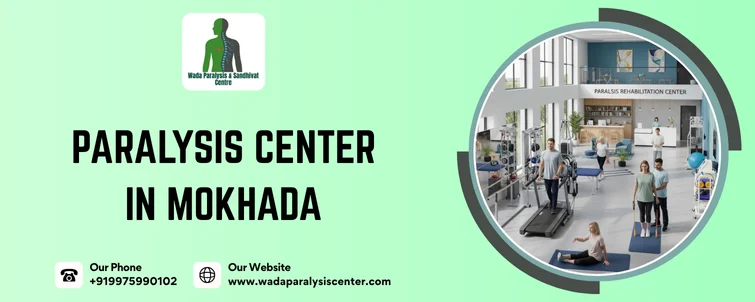



Table of Contents
ToggleParalysis is one of the most complex neurological disorders affecting an individual’s ability to move or control muscles. Finding the right care provider is crucial when dealing with such a life-altering condition. For residents of Mokhada and nearby regions in Maharashtra, the Wada Paralysis Center stands as a trusted destination for advanced rehabilitation, medical excellence, and personalized treatment. The center’s mission is to restore hope, mobility, and independence to those affected by paralysis through evidence-based therapies and compassionate care.
In this blog, we’ll take an in-depth look at the paralysis Center in Mokhada, its specialized services, the types of paralysis treated, and the reasons why Wada Paralysis Center is considered one of the most reliable rehabilitation facilities in the region.
Paralysis can be defined as the loss of muscle function in part or most of the body. It may occur suddenly after an injury or as a result of a chronic medical condition. The primary cause of paralysis is the disruption of communication between the brain and muscles. This can happen due to damage to the spinal cord, brain, or nerves.
The paralysis center in Mokhada focuses on a thorough diagnostic approach to identify the root cause of the condition before designing a personalized rehabilitation program. Common causes of paralysis include:
The severity of paralysis depends on the underlying cause and the extent of neurological damage. Early medical attention at a reputable paralysis center in Mokhada, like Wada Paralysis Center, significantly improves the patient’s prognosis.
The Wada Paralysis Center provides complete assessment and treatment for different types of paralysis, including:
Each condition requires its own set of rehabilitation strategies, which are provided systematically at the paralysis center in Mokhada.
The Wada Paralysis Center has established its reputation as one of the premier paralysis centers in Mokhada by prioritizing patient-centered care, state-of-the-art medical infrastructure, and specialized rehabilitation therapies. The center combines medical expertise with emotional support to ensure the physical and psychological well-being of every patient.
Here are the key reasons why patients prefer the Wada Paralysis Center:
The paralysis center in Mokhada follows a step-by-step treatment plan to ensure gradual yet sustainable recovery. Rehabilitation plays the most critical role in helping patients regain mobility, improve muscle coordination, and restore functional independence.
1. Physiotherapy
Physiotherapy is the foundation of paralysis recovery. The Wada Paralysis Center uses targeted exercises to strengthen muscles, improve blood circulation, and reactivate neural pathways. Electrotherapy, hydrotherapy, and stretching are common techniques practiced by physiotherapists here.
2. Occupational Therapy
Occupational therapy focuses on helping patients relearn essential daily skills, such as dressing, eating, and personal hygiene. The therapists at the paralysis center in Mokhada design activities customized for each individual’s physical abilities.
3. Speech Therapy
Stroke-induced paralysis often affects speech and swallowing. The Wada Paralysis Center provides dedicated speech therapy sessions to help patients regain communication and eating abilities.
4. Neurotherapy
Neurotherapy plays a major role in stimulating the affected areas of the nervous system. The paralysis center in Mokhada applies modern neurotherapeutic methods to restore brain-body coordination.
5. Psychological Support
Paralysis can lead to mental distress, depression, and anxiety. The center’s counselors and psychologists offer support to help patients and families cope positively with emotional stress.
The Wada Paralysis Center takes pride in its world-class infrastructure tailored for comfort, accessibility, and advanced care. The facility includes:
The paralysis center in Mokhada ensures that patients receive state-of-the-art medical care within a peaceful healing environment.
One of the major strengths of the paralysis center in Mokhada is its individualized approach. Each patient undergoes a comprehensive assessment by neurologists and rehabilitation experts to develop a tailored treatment program. The stages typically include:
Personalized treatment ensures that the focus remains on the patient’s progress and long-term independence.
Nutrition plays a vital role in the recovery process. The Wada Paralysis Center provides dietitian-guided meal plans to promote nerve repair and muscle strength. The paralysis center in Mokhada offers:
Balanced diet planning accelerates recovery and prevents complications like malnutrition or weight loss.
Recovery does not end with hospital discharge. The Wada Paralysis Center believes in extending consistent support even after patients return home. The paralysis center in Mokhada provides:
This continuity of care ensures sustained progress and minimizes the risk of relapse.
Over the years, the Wada Paralysis Center has transformed countless lives. Many patients who arrived bedridden have successfully regained their ability to walk, speak, and live independently. These real-life transformations inspire others to trust in rehabilitation and the capabilities of the paralysis center in Mokhada.
Each recovery journey is documented and analyzed for research and clinical improvement. This commitment to continuous learning and innovation keeps the center ahead in the field of neurological rehabilitation.
Although not all cases of paralysis are preventable, early attention to warning signs can reduce severity. The team at the paralysis center in Mokhada shares the following recommendations:
Timely care at a specialized facility like the Wada Paralysis Center can help identify minor neurological symptoms before they lead to full paralysis.
Accessibility and affordability are central to the vision of the paralysis center in Mokhada. Wada Paralysis Center offers customizable packages depending on the patient’s condition and therapy duration. These include:
The focus is to make quality treatment available to all, irrespective of financial status or geographical constraints.
Family involvement is critical during the rehabilitation process. The paralysis center in Mokhada encourages family members to actively participate in therapy sessions. Caregivers are trained to support patients with daily movements, emotional motivation, and safety precautions. This collaborative care accelerates healing and builds stronger confidence in patients.
The Wada Paralysis Center conducts frequent medical camps, awareness workshops, and educational sessions in Mokhada and nearby villages. These initiatives aim to educate people about symptoms, prevention, and the significance of early treatment. Through these efforts, the paralysis center in Mokhada is building a healthier, more informed community.
The Wada Paralysis Center constantly upgrades its protocols with new technologies and medical research. The integration of robotics, virtual reality therapy, and AI-based physiotherapy monitoring is being explored to make therapy more efficient. The paralysis center in Mokhada envisions becoming a model neuro-rehabilitation institute in India that blends clinical excellence with compassion.
The Wada Paralysis Center is accessible to patients from Mokhada, Wada, Vikramgad, and nearby talukas in Maharashtra. To visit or schedule a consultation, patients can call the helpdesk or use the official website for appointment bookings. The facility ensures quick response and personalized guidance to every inquiry related to the paralysis center in Mokhada.
Wada Paralysis Center in Mokhada is known for providing advanced and holistic treatment for paralysis patients, focusing on both physical rehabilitation and neurological recovery.
We offer treatment for all types of paralysis including stroke-induced paralysis, spinal cord injuries, hemiplegia, paraplegia, and facial paralysis through physiotherapy, Ayurvedic therapies, and advanced neuro-rehabilitation.
Yes, our center specializes in personalized physiotherapy sessions designed to improve muscle strength, joint mobility, and nerve function for paralysis patients.
Absolutely. Wada Paralysis Center integrates Ayurvedic and Panchakarma therapies with modern rehabilitation techniques to speed up recovery and restore balance in the nervous system.
Recovery time varies depending on the severity of the condition, age, and overall health. Some patients see improvement within a few weeks, while others may take several months of continuous therapy.
Yes, we offer comfortable residential treatment facilities for patients who require long-term care, supervision, and intensive therapy sessions.
Many stroke patients have shown significant improvement through our specialized stroke rehabilitation programs. The extent of recovery depends on early treatment and consistent therapy.
Yes, for patients who cannot travel, we offer home physiotherapy sessions in and around Mokhada and nearby areas.
You can call our helpline or visit the center directly to schedule an appointment. Walk-ins are also welcome for initial consultations.
Wada Paralysis Center is conveniently located in Mokhada, easily accessible from nearby towns and villages. Contact us for the exact address and directions.

The journey of paralysis recovery requires patience, medical expertise, and emotional resilience. The Wada Paralysis Center combines all these aspects to ensure every patient’s journey from paralysis to recovery is possible, comfortable, and hopeful. With its multidisciplinary team, modern facilities, and dedicated support programs, the paralysis center in Mokhada stands as a symbol of healing and trust for the entire region.
If you or your loved one needs advanced rehabilitation for paralysis, Wada Paralysis Center offers a path to recovery and independence through expert care and unwavering support. The first step toward regaining control starts with seeking the right help—choose the best paralysis center in Mokhada and begin your recovery today.
